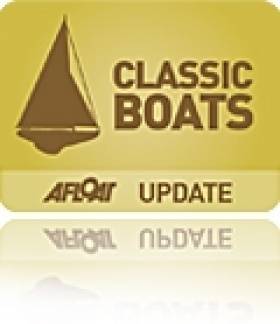Displaying items by tag: scottish traditional boat festival
#STBFestival. – Weigh your anchor, fill your sails and get ready for the 2014 Aberdeen Asset Management Scottish Traditional Boat Festival. Thousands of visitors are expected to attend the 21st annual festival which will be taking place in Portsoy, Aberdeenshire from June 27-29th 2014.
Scotland's leading celebration of maritime and cultural heritage is one of the key events in The Year of Homecoming, with the theme reflected throughout the festival programme. The event will showcase the best in Scotland's maritime, crafts, food, drink, music and dance, with a special emphasis on boat building, restoration and sailing.
Traditional wooden boats from all over the UK and beyond will congregate in the historic 17th century Portsoy harbour. Visitors will be able to learn how to sail a coracle, climb aboard restored fishing vessels, and see the crews of the St Ayles Skiffs battle it out on the open seas in the annual regatta. This year will also see the official opening of the PORT Boatshed, a community boat building workshop which allows training and restoration to be undertaken.
Aberdeen Asset Management Scottish Traditional Boat Festival Chair, Roger Goodyear, says, "The Festival has a great programme that offers a fantastic traditional maritime experience. Each year our Festival continues to grow stronger and draw in huge crowds- the small town usually only has a population of 2000 people, and this rises to an incredible 16,000 people over the weekend of the Festival.
"Now in its 21st year, we hope to continue to build on its enviable reputation for showcasing the very best in traditional maritime festivities with a range of craft, food, drink, music and dance events. What started as a small community celebration to mark the 300th anniversary of Portsoy harbour has grown to become recognised by VisitScotland as one of the region's flagship tourism events, which is a fantastic boost."
The music programme will feature the very best of traditional music including popular Scottish folk singers and local favourites. The music line up this year reflects the Year of Homecoming by bringing together local musicians and performers from around the world including headliners RURA, festival favourites De Kinkels from the Netherlands and Slogmaakane, fabulous shanty singers from Norway.
The festival craft marquee is set to attract artists and craft workers from across Scotland, while food and drink from the North-east's larder will on show at the Wally Green Food Fayre.
Caroline Packman, Homecoming Scotland Director, says, "Homecoming places the spotlight on our greatest assets and celebrates all that's great about our country, so it's only fitting the Scottish Traditional Boat Festival is part of the packed Homecoming programme of events. Scotland is the perfect stage for major cultural events and the Boat Festival provides a truly enchanting example of the regions rich heritage and culture. Whether you are interested in crafts, historic vessels, boat races or it's simply a day out with the family - there's truly something for everyone at Portsoy."
For more information about the Festival and to buy tickets visit www.stbfportsoy.com.
An adult day ticket to the festival costs £8, children aged five to 18 and concessions are £5. Adult weekend tickets are priced at £12 and children and concessions at £8. There are also family tickets available which allow entry for two adults and three children for £25 for a day ticket and £35 for a weekend. Children under five go free. Car parking is available and costs £2, with the price including a brochure.




























































